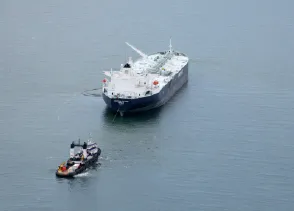 Ecopetrol warns of increase in illicit valves in transport systems
Ecopetrol warns of increase in illicit valves in transport systems
Ecopetrol warns of increase in illicit valves in transport systems
Jan 4, 2021
- In the first eight months of the year, close to 900 illegal connections were identified in transport pipelines.
- In that period, crime has stolen about 2,500 barrels of hydrocarbons per day.
- At least 20 municipalities in the country have been affected by this criminal practice.
- The Company invites communities to report this crime to the authorities.
Ecopetrol reports that between January and August 2020 close to 900 illicit valves have been identified and removed in the hydrocarbon transport pipelines throughout the country, which means that every day, on average, 3 illicit connections occur through which groups outside the law steal crude oil or refined fuels.
The trend of installing illegal valves is increasing if you take into account that at the same time of 2019, close to 747 illegal connections were detected in oil pipelines and polyducts.
In total, this year there is an average theft of 2,500 barrels of hydrocarbons per day, of which 2,439 correspond to crude oil, most coming from the Caño Limón-Coveñas pipeline.
The seizure of hydrocarbons, as it is technically called, is a crime that puts neighboring communities at risk (especially for fuel) and affects the environment (mainly for spilled crude), since this type of illegal installations is done in a rudimentary or artisanal way and sometimes leaves leakage of products that affect soils and water resources and impact flora and fauna.
Among the most affected systems are the Transandino pipelines (OTA), in which 706 illegal drilling has been found, most in the municipalities of Tumaco, Ricaurte and Barbacoas, in Nariño, and the Caño Limón – Coveñas with 27 illegal valves, most in the municipalities of Tibú and El Tarra in Norte de Santander.
As for fuel transport systems, there are 50 illegal installations, most of them in the Pozos Colorados-Galán polyduct that runs from Santa Marta to Barrancabermeja. The records in this system yield a total of 12 illegal, mainly in the municipalities of Ciénaga and Aracataca, in Magdalena, and Aguachica and Rio de Oro, in Cesar.
In the center of the country, there are also affectations resulting from the theft of fuels to the Sevastopol - Salgar polyducts in the Middle Magdalena, and Sevastopol – Tocancipá. In these cases the events have been recorded in towns such as Puerto Boyacá, Barrancabermeja, Cimitarra, Puerto Salgar, Suesca and Lenguazaque, among others.
In the last three months this crime has intensified in the west of the country where theft of fuels was recorded in the Carthage-Yumbo and Yumbo - Buenaventura polyducts, at the height of Guacarí, Buenaventura and Dagua municipalities.
The figures are increasing if the actions recorded in the infrastructure in the production fields are included. In the course of the year, 106 illegal connections were recorded in the gas or crude oil lines of the wells, which added to the 789 occurred on Cenit transport lines to account for a figure close to 900 illegal valves.
Ecopetrol calls on rural communities neighboring hydrocarbon transport systems to be alert and report to the authorities any suspicious acts in the infrastructure. At the same time, it rejects such actions that violate the security of the regions through which the pipelines pass.
Ecopetrol has been working with the military, the police and regional and local authorities to prevent and promote the complaint against the seizure of hydrocarbons. It frequently develops informative days to generate greater awareness among the population about the dangers that this crime entails and the importance of reporting.

